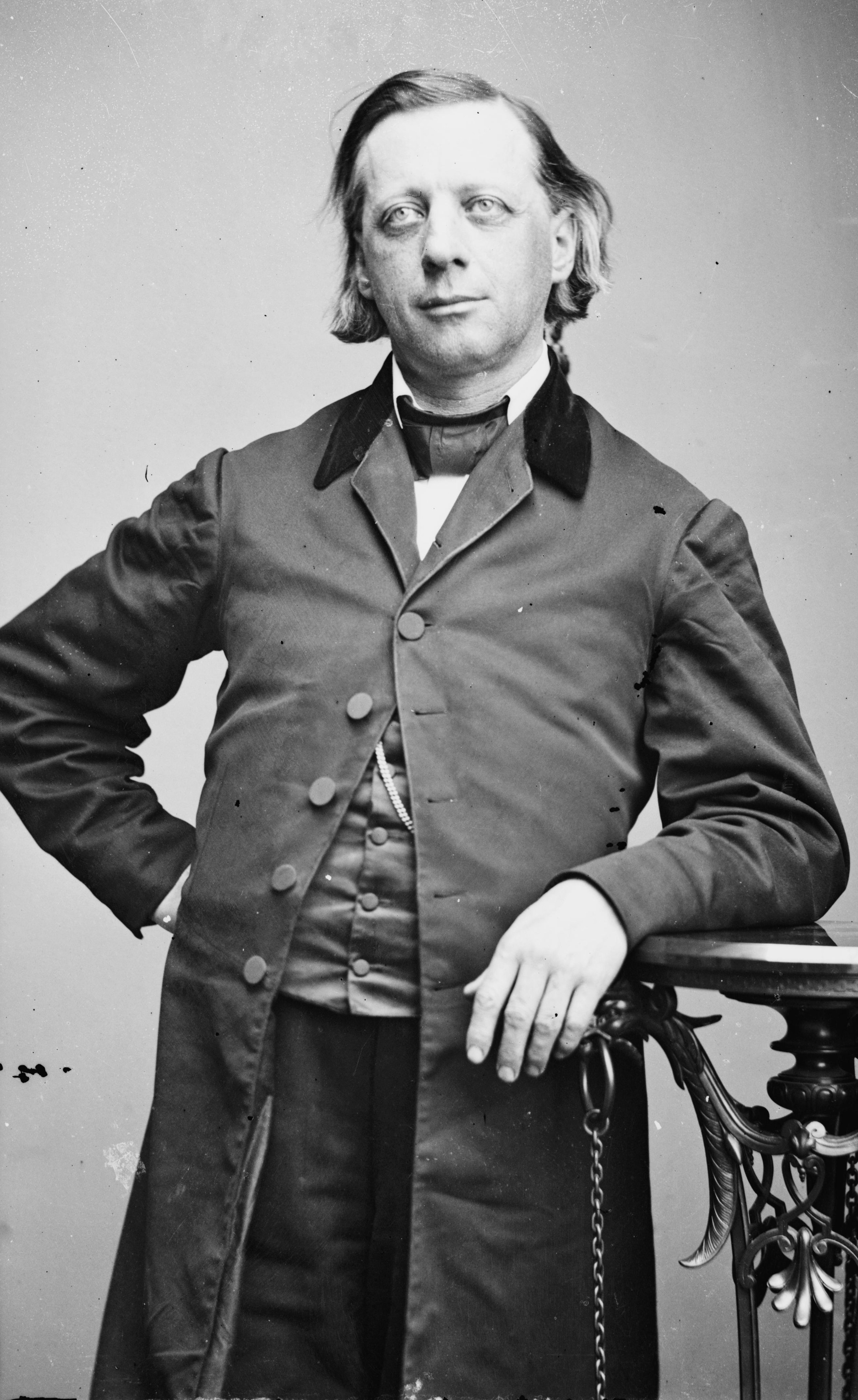Henry Ward Beecher
Henry Ward Beecher was born in 1813 in Litchfield, Connecticut, the eighth of eleven children of the Rev. Lyman Beecher, minister of the established Congregational church there, and his first wife, Roxana Foote, who died when Henry was three. He grew up in a crowded parsonage with his father, who became one of the most prominent clergymen of that era, his stepmother, siblings and half siblings, and assorted relatives and servants. He was especially close to his sister Harriet, two years his senior, who later married Calvin Stowe and wrote Uncle Tom's Cabin. This friendship with Harriet continued throughout their lives, and she was still listed on the membership rolls of Plymouth Church when she died in 1896.
Henry, bashful and mumbling as a child, began his oratorical training at Mt. Pleasant Institution, a boarding school in Amherst, Massachusetts. He graduated from Amherst College in 1834 and in 1837 from Lane Theological Seminary outside of Cincinnati, Ohio, which his father then headed. After serving Presbyterian churches in Lawrenceburg, Indiana, and in Indianapolis, he and his wife, the former Eunice Bullard, and their three surviving children moved to Brooklyn in the fall of 1847 where Beecher undertook with relish the creation of a new Congregational church.
The most famous of these former slaves was a young girl named Pinky, auctioned during a regular Sunday worship service at Plymouth on February 5, 1860. A collection taken up that day raised $900 to buy Pinky from her owner. A gold ring was also placed in the collection plate, and Beecher presented it to the girl to commemorate her day of liberation. Pinky returned to Plymouth in 1927 at the time of the church's 80th anniversary to give the ring back to the Church with her thanks. Today, Pinky's ring and a copy of the bill of sale can still be viewed at Plymouth.
Despite these highly publicized activities, Beecher was viewed as a moderate compared to other abolitionists, and that perception greatly contributed to his influence. He never expected that a war would be required to free the slaves in the South, but when it came, the impact of his steadfast antislavery stance on public opinion helped the North endure horrific bloodshed.
From his earliest sermon in Brooklyn, Beecher made it plain that one cornerstone of his ministry at Plymouth would be his opposition to slavery, and it was that position, plus his powerful preaching, which quickly built Plymouth Church into the most prominent Protestant church of that era. His preaching was characterized by “originality, logic, pathos, and humor,” in the words of a contemporary, and stalwartly and eloquently he preached and wrote that slavery was a sin. He also spoke out against U.S. arrogance toward Mexico, and against mistreatment of the Indians, but it was his antislavery preaching which made him famous. He sent rifles to the Kansas territory, he obtained the chains with which John Brown had been bound, trampling them in the pulpit, and he also held mock “auctions” at which the congregation purchased the freedom of real slaves.
In the early days of the Civil War, Beecher pressed President Lincoln to issue a proclamation of emancipation. He went on a speaking tour in England to explain the North's war aims and to undermine support for the South among the English, whose economy had been hurt by the embargo against Southern cotton. Just as the war was drawing to a close, Beecher was the main speaker when the Stars and Stripes were again raised at Fort Sumter, South Carolina, site of the war's first battle.
Although remembered today for his social activism, in his own time Beecher was always, foremost, a minister of the Christian gospel. He was one of the leaders in the movement known as Romantic Christianity, preaching not the harsh judgment of God, as had his ancestors, but rather the loving presence of God. He also espoused the concept of the freedom of the individual with a social conscience, a cornerstone of Congregational belief. After the war, Beecher championed such causes as women's suffrage, temperance, and evolution, and he spoke out against anti-Semitism.
Beecher suffered a stroke in March of 1887 and died quietly in his sleep two days later. Brooklyn, still an independent city, declared a day of mourning. The state legislature recessed, and telegrams of condolence were sent by national figures, including President Cleveland. His funeral procession to Plymouth Church--led by a Black commander of the William Lloyd Garrison Post in Massachusetts and a Virginia Confederate general and former slaveholder, marching arm in arm - paid tribute to what Beecher helped accomplish.
Henry Ward Beecher was laid to rest in Brooklyn's Green-Wood Cemetery on March 11, 1887, survived by his wife Eunice, and four of the nine children born to them: Harriet, Henry, William and Herbert.
Other Resources
The Most Famous Man in America, web resource of Pulitzer Prize-winning biography of Henry Ward Beecher by Debby Applegate





